Stuart Garner Pleads Guilty To Illegal Pension Investments
Former Norton Motorcycle owner, Stuart Garner, has pleaded guilty to illegally investing an estimated $14.8 million in Norton’s pension scheme back into the company.
Garner was the sole trustee of three contribution schemes (Dominator 2012, Commando 2012 and Donington MC) that invested in Norton between 2012-2013, in which 227 people invested in return for preference shares.
In the UK, under Employer-Related Investment (ERI) it is illegal to invest more than five percent of the total value of the schemes back into the company, however Garner has pleaded guilty to investing the full amount.
Nicola Parish, Executive Director of Frontline Regulation at TPR, said, “As a trustee, Stuart Garner failed to comply with restrictions on investments which are designed to protect the funds of pension schemes. Trustees have a vital role in protecting the benefits of members and we will take action where that responsibility is abused.
“Trustees should be clear on when a pension scheme can invest in its sponsoring employer.”
The guilty plea is just the latest issue for the embattled Garner, who was ordered to pay back $18.9 million to the Norton’s pension scheme. Garner is due to appear at Derby Crown Court on February 28 for sentencing. CN
Posted on February 7, 2020, written by Alan Cathcart:
Norton Motorcycles Enters Administration. Is this the end of the road?
The eventful history of Norton Motorcycles—Britain’s most historic sporting brand—took yet another twist on January 30, when the Castle Donington-based UK manufacturer was put into administration.
The insolvency process was triggered earlier last month when Norton was taken to court by UK tax authorities HMRC for payment of GBP 300,000 ($386,737) in outstanding taxes. The case was adjourned until February 12, after it transpired that Norton had already reduced that sum from GBP 600,000 ($773,474), and was making regular further payments.
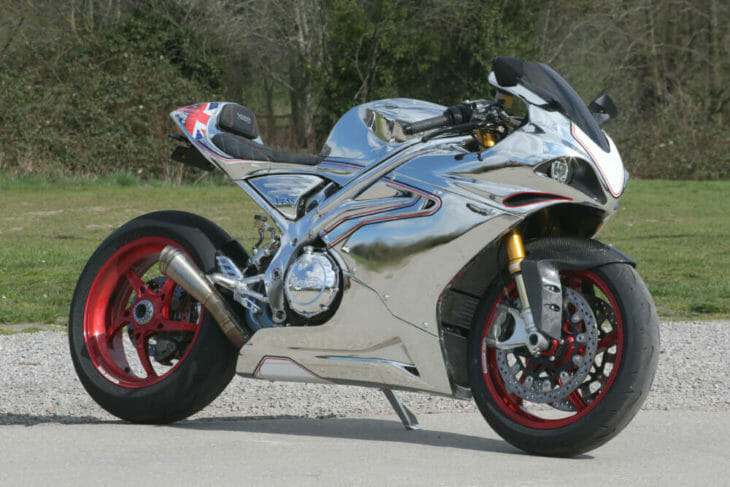
But on January 30, major public accounting firm BDO/Binder Dijker Otte was appointed as administrator for Norton Motorcycles (UK) Ltd. and is presently assessing the chances of the company being reconstituted for sale as a going concern after all attempts to save the business failed to secure the financial backing needed to continue trading.
The essentially under-capitalized firm had previously launched a crowdfunding share scheme last November with a view to raising the cash required to fulfill its apparently healthy order book, but the supposed lure of a single investor who has never been identified saw the offer withdrawn. This left Norton unable to source funds to resolve its critical cash-flow issues, and the company is now in the hands of its administrators
Norton Motorcycles Administration—Stuart Garner Speaks
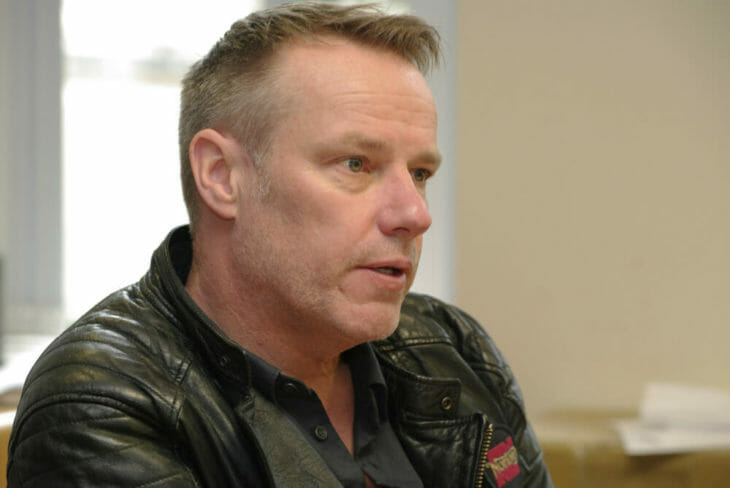
This prompted Norton CEO Stuart Garner to release a statement on January 31. “I’m devastated at the events over the last 24 hours, and personally have lost everything,” he declared. “However, my thoughts are with the Norton team and everyone involved, from customers, suppliers, and shareholders at this truly difficult time. Without [any] dialogue Metro Bank appointed BDO [as] administrators yesterday. We are now working positively and proactively with BDO to ensure Norton has the best possible chance to find a buyer. It has become increasingly difficult to manufacture in the UK, with a growing tax burden and ongoing uncertainties over Brexit affecting many things, like tariffs, exports, and availability of funding.”
Stuart Garner is understood to have personally owned 86 percent of Norton Motorcycles’ equity, with the balance held by three longtime friends of his, each with a small single-digit percentage shareholding.
Besides Norton, two other Garner companies have also entered administration. One is Donington Hall Estates, owner of the 229-year old stately home adjacent to the Donington Park former MotoGP/F1 racetrack, in which Garner has been living, the other the adjacent 42-bedroom Priest House Hotel, set in a converted Norman-era mill tower and adjoining 17th-century cottages.
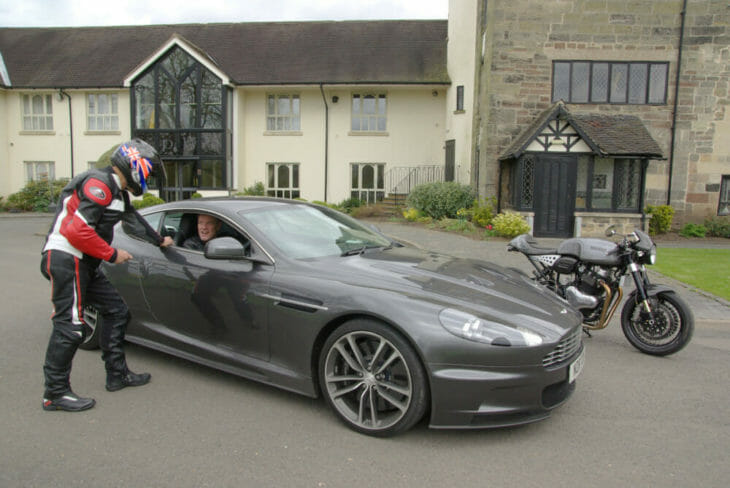
The 80-acre (32 hectares) Donington Hall estate houses the 55,000ft² Norton factory and recently built 12,000ft² of extra covered space added to it to accommodate volume production of the range of newly launched 650cc Atlas twins, which has not yet however been fitted out with machinery. The Norton workforce formerly numbered around 100 people, but this headcount was substantially reduced in recent months, as the cashflow problems Norton is suffering from began to take effect.
Stuart Garner, 50, is the man who in October 2008 bet big on being able to revive Norton, when he acquired the rights to the historic British marque from its previous American owner, Boston, Mass. investment banker Oliver Curme. This came after Curme had succeeded in consolidating the global rights to the previously diffused Norton trademark, which had been regionally owned by such diverse entities as a Canadian entrepreneur with links to organized crime (who later served jail time for fraud), a Chinese trademark troll, and Norton’s German distributor Joe Seifert, who’d been farsighted enough to register the company name in most European countries, in order to safeguard it.
In 2006 Curme reached an agreement with MV Agusta’s then-owner Claudio Castiglioni for him to acquire the Norton name as a volume production twin-cylinder brand to generate profits and thus cashflow alongside the low volume higher-cost MV Agusta range of fours (and later triples). But this sale was aborted by the refusal of Gevi SpA, the investment bank then holding a controlling 57.75 percent interest in MV, to countenance the deal—though not before MV’s legendary designer Massimo Tamburini had created the makings of a born again Norton Commando!
Norton Motorcycles Administration—How Garner took control
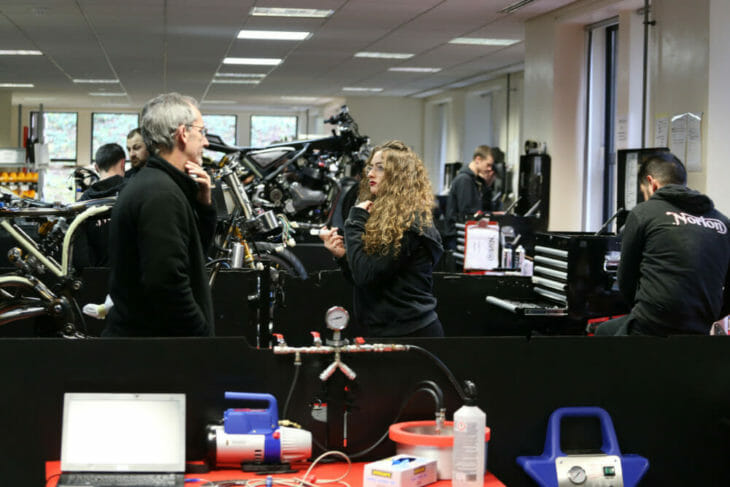
Instead, two years later, Curme sold Norton to British entrepreneur Stuart Garner, a former gamekeeper turned property investor, who’d become Britain’s leading importer of fireworks from China. Together with the Norton brand came the prototype air-cooled Commando 961 OHV parallel-twin streetbike which Curme had commissioned from the USA’s No.1 Norton technical guru, Oregon-based Kenny Dreer.
Norton’s current Executive Director and Head of Design, Simon Skinner, joined the new company in February 2009 from Triumph as one of Stuart Garner’s first appointments, and he’s remained with the firm ever since. After Norton was established in a compact 8,000ft² start-up factory alongside the Donington Park race circuit housing a dozen employees, Skinner began work on re-engineering the Commando 961 for series production. Deliveries began in 2010, but problems with lack of development and Garner’s commitment to employing largely UK suppliers unequipped for series production, brought the company close to collapse—just as France’s Voxan had done for the same reasons little more than a decade earlier.
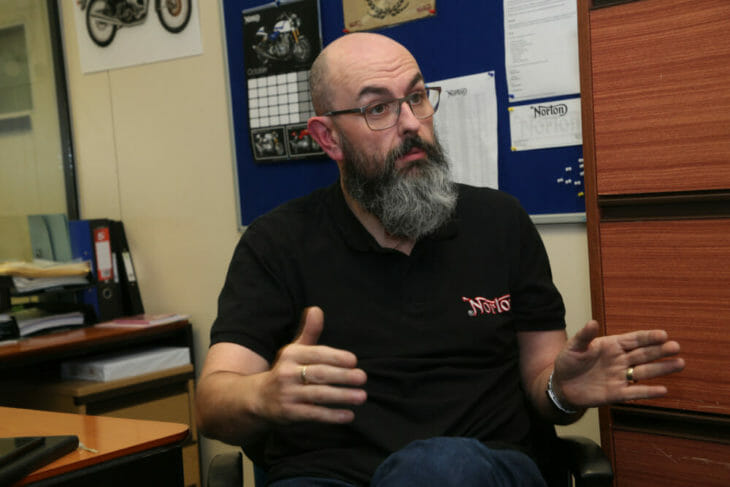
But thanks to the determined commitment of both Garner and Skinner, and financial support from Santander Bank and the British government—the most significant such aid coming in 2015, when Norton was awarded a GBP 4 million ($5,156,369) development grant—the Commando 961’s various technical problems were gradually resolved, and production built steadily.
However, it’s understood that to date no Norton model built during Garner’s ownership of the brand has ever been type-approved in the UK—all deliveries have been individually homologated via the UK’s near-unique SVA/Single Vehicle Approval system. Meanwhile, in 2013, the company expanded massively with a move to Donington Hall, where alongside the core Sport and Café Racer versions of the Commando, several limited-edition models based on the 961 platforms were built, carrying historic names from the Norton back catalogs like Dominator and Domiracer. Norton was by now exporting around 80 percent of its production, which was claimed to be creeping towards 1,000 units annually.
Norton Motorcycles Administration—Back to the Isle of Man
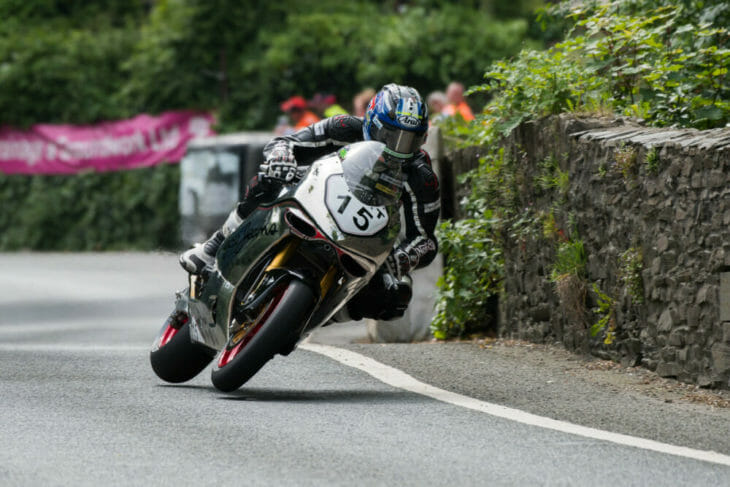
Moreover, coinciding with the move to Donington Hall, Garner took Norton racing again for the first time in two decades, by entering the Isle of Man TT exactly 20 years after Steve Hislop’s legendary Senior TT win on the Norton NRS588 rotary. To do so, he employed a 1000cc Aprilia RSV4 Superbike motor in a specially-built Norton frame constructed by Spondon, the legendary frame specialist located in nearby Derby which he had meantime acquired. The SG1 Norton racer was presented as the first step towards creating a range of modern 1200cc V4 Norton models and involved returning to the Isle of Man six years running to race in the TT, with Aussie riders David Johnson and Josh Brookes both lapping the 37¾-mile TT Course at over 130mph in 2017. This resulted in top 10 finishes for each rider in both the Superbike TT and Senior TT races on the Norton SG6 racebike, using a factory-supported version of Aprilia’s three-time World Superbike champion RSV4 motor, with Brookes finishing fifth in the 2018 Senior TT with a best lap of 131.745mph.
Norton Motorcycles Administration—The models that never came
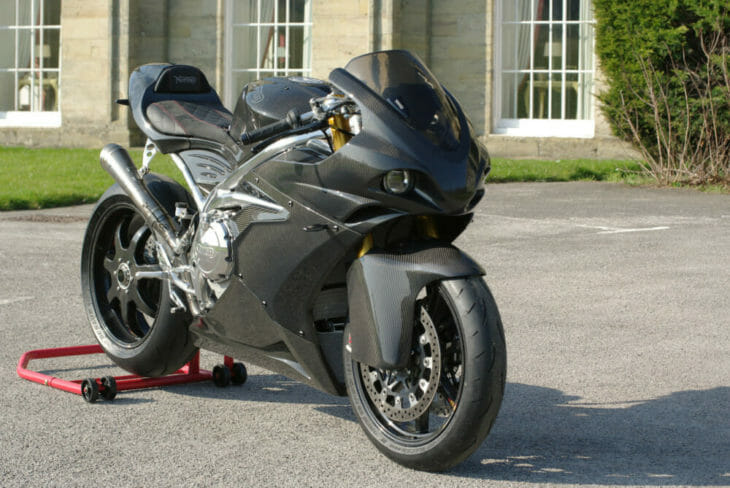
As promised, at the Birmingham NEC Show in November 2016, Norton launched its limited edition (200-off) V4 SS and series production V4 RR, the first all-British hyper sports road bike ever to reach the marketplace, powered by its own Euro 4 compliant liquid-cooled 16-valve 72° V4 engine with chain-driven DOHC producing over 200 bhp.
This was installed in a chassis design closely derived from the SG6 IoM TT racer’s, and was largely self-developed by Norton at Donington Hall, after an initial collaboration with leading design consultants Ricardo was terminated.
But while the limited-edition V4 SS apparently sold out quickly at the GBP 44,000 ($56,708) asking price, forcing those not fast enough to opt instead for the lower-spec V4 RR at GBP 28,000 ($36,087), the cash-flow needed to acquire the necessary parts to build the models to satisfy that demand simply wasn’t there, and the company did not have sufficient spare capital to fast forward production to generate such cash.
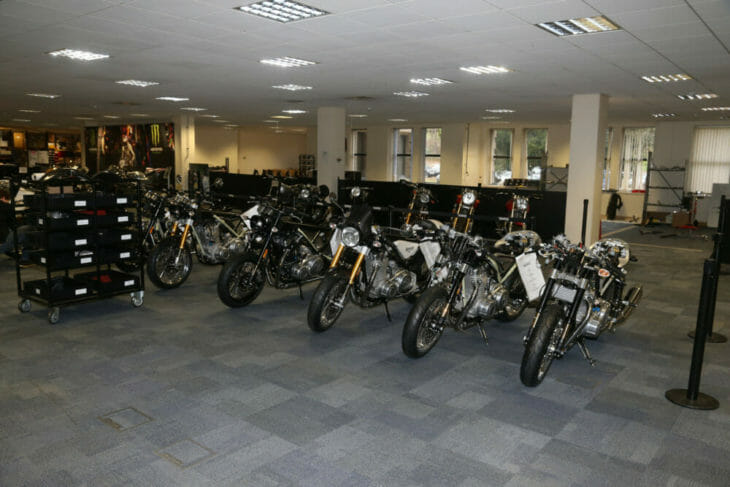
The first such bikes were only delivered to customers late in 2018—just as the 84 bhp 650cc parallel-twin Atlas Nomad and Ranger models were unveiled at that November’s NEC Show, with the duo reaching production readiness just as the business was placed in administration. The high-performance 102 bhp twin-injector Superlight version made a promising debut in the 2019 Lightweight TT when Peter Hickman rode a brand-new street-legal bike to finish eighth in the race after some minor problems, having lapped at over 120mph on a 650cc bike he’d never ridden before race week. A supercharged carbon-framed Superlight RR prototype of the same model was unveiled at the NEC Show last November.
These three-volume production Atlas models were intended to underwrite the company’s growth, finally providing the needed cash flow to underpin the ongoing development of the smaller volume V4s. They were developed in conjunction with Chinese giant Zongshen, with the extremely compact parallel-twin engine with 270° crank entirely developed in-house at Norton, according to Simon Skinner.
But its commercial existence was linked to a deal which Norton had made to supply Zongshen with a lower-performance 650cc twin-cylinder engine design for volume manufacture on its production lines in China. As part of that, Zongshen was to supply certain key parts to Norton for it to manufacture its own more powerful version of the motor, including the horizontally-split crankcases, the eight-valve DOHC cylinder head, and both camshafts and crankshaft, leaving Norton to source the other parts necessary to build the engine locally in the UK. Essentially, this meant that Norton had found a dependable Asian supplier of key parts at affordable prices, without having to copy its near neighbor Triumph in establishing its own factory in Thailand or elsewhere to achieve this. But this strategy is now in doubt, following the firm’s collapse into administration.
Norton Motorcycles Administration—The insolvency
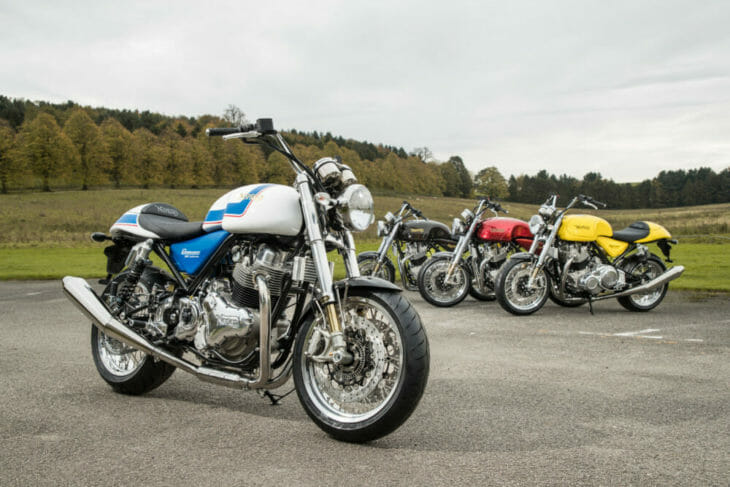
Norton’s insolvency has been an ever-present risk since its auditor warned in the firm’s published accounts for the year to March 31, 2018, when turnover was GBP 6.7 million ($8,634,313) and pre-tax profits GBP 33,701 ($43,430) – that, “A material uncertainty exists that may cast a significant doubt on the company’s ability to continue as a going concern.”
Indeed, prior to the current administration, HMRC had previously submitted another winding-up order on Norton in March 2019; as did DHL International in August 2019, both later withdrawn—presumably after payment of the amounts in question. Viewed from outside without access to current accounts, it’s evident that the firm essentially lacks the necessary cashflow to manufacture the truly excellent motorcycles it’s developed.
It’s a classic example of spending too much money on R&D, without commensurate income or paid-up capital to support that—a vicious circle which MV Agusta, and other such small to medium-sized manufacturers in Italy and elsewhere, have repeatedly suffered from. As the only person outside Norton to have test ridden both the 1200 V4 SS and the Atlas 650 Nomad and Ranger models in production-ready guise, I can only applaud Skinner and his R&D team for having produced two such excellent platforms on the most slender of resources. The task now is for BDO to find a buyer for the company able to bring the twin-cylinder models to production, with the V4 platform sadly likely to be consigned to cold storage.
Norton Motorcycles Administration—Buyers step forward
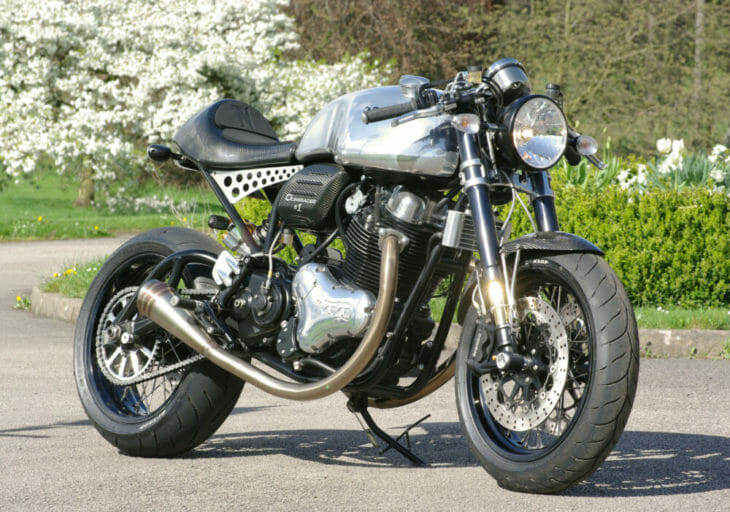
And there is no shortage of suitors. Amongst those known to be investigating the acquisition of the Norton brand are three Indian manufacturers, as well as Russian investor Timur Sardarov, who recently completed his outright purchase of MV Agusta from the Castiglioni family. In a rerun of 2006 but with different actors, Sardarov says he’s primarily interested in obtaining the use of the 1200 V4 and 650 Atlas engines, presumably for use in an MV Agusta range of models bracketing the forthcoming 950 triples, which will form the main basis of the MV family of bikes in the coming decade. Having access to the Norton trademark is less important for him—but with former Ducati boss Massimo Bordi now running MV Agusta for him, Timur’s mind may be changed for him! Another entrepreneur who must remain nameless, but who has an outstanding track record in the past quarter-century of revitalizing historic brands for stock market flotation, is also working on acquiring Norton and making it a going concern—although if he acquires it, he’ll focus on the parallel-twins which he’s identified as the Norton brand’s mechanical trademark, with the intention of developing a separate family of 1000-1200cc twin-cylinder models to complement the 650 Atlas family.
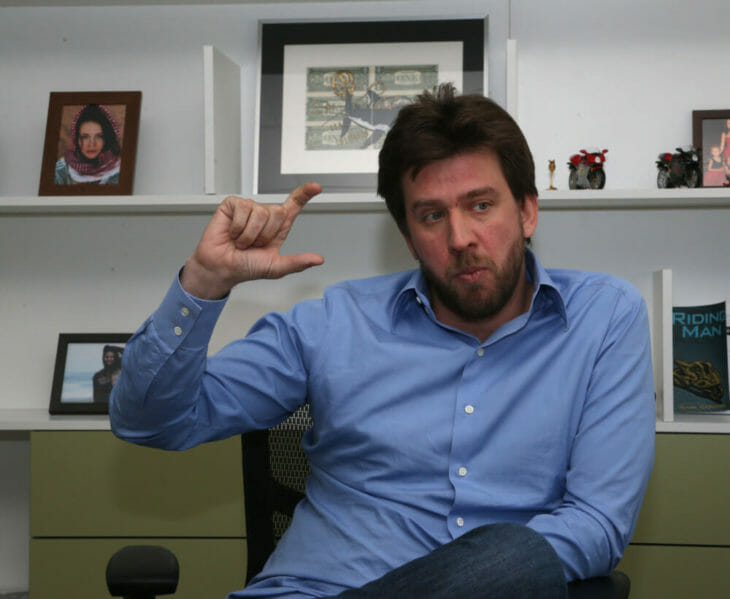
Having recently acquired Bimota, with production about to start in Italy in June of a range of models spearheaded by the all-new Euro 5 homologated, hub-center Tesi powered by its supercharged H2 four-cylinder motor, Kawasaki’s parent group Kawasaki Heavy Industries may well consider Norton an attractive British acquisition, which combines a historic brand with leading-edge technology.
Also in Asia, apart from the obvious potential benefits to China’s Zongshen giant in acquiring Norton itself, expect its billionaire rival Li Shufu to be interested in adding Norton to his collection of historic brands. The current outright owner of Volvo, Lotus Cars, the London Taxicab Company and, on two wheels, Benelli QJ alongside his Geely car empire and 9.8 percent holding in Daimler-Benz—its largest individual shareholder—is highly likely to be a player in acquiring Norton. Mr. Li is a visionary investor who’s unafraid to roll the dice.
The same applies to Indian industrialist Siddhartha Lal, owner of Royal Enfield via his Eicher Corp. parent company. But Lal is unlikely to be interested in Norton, because of growing RE capacity problems which have seen it terminate production of its 500 Classic single seemingly in order to concentrate on meeting the steep demand both in India and abroad for its 650cc Continental GT and Interceptor twins.
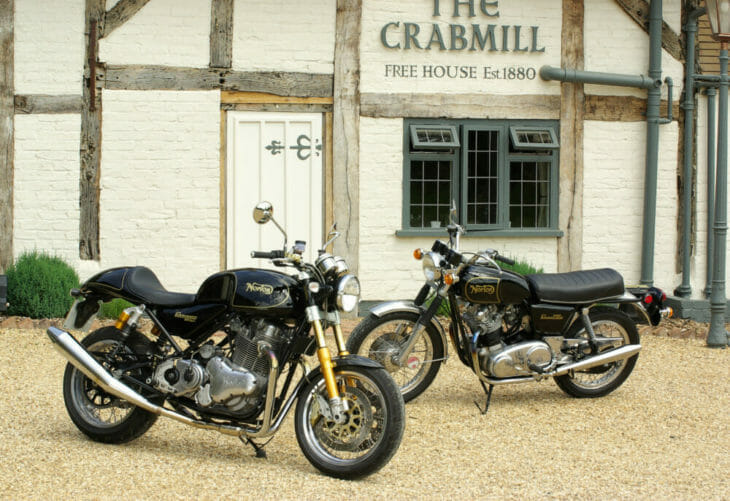
Instead, expect greater interest in acquiring Norton to emanate from Rajiv Bajaj, Lal’s counterpart at Bajaj Auto, KTM’s Indian partner which has recently announced a non-equity partnership with John Bloor’s Triumph Motorcycles. For history buffs, the thought of Triumph and Norton cohabiting once again in the same family of brands is an enticing prospect—and the same goes for BSA and Norton.
India’s giant Mahindra Corp. is about to relaunch the historic British brand BSA later this year after acquiring the trademark over three years ago in October 2016, and adding Norton to its roster of British brands may be appealing—if only to prevent any of its local rivals from obtaining it. These would be headed by Hero Motocorp, which since splitting from Honda in 2011 has maintained its market leadership in its home market—albeit without any branding other than its own.
Adding Norton to its roster as a means of rivaling Royal Enfield’s local leadership in the so-called ‘Superbike’ sector with its 650 twins, might entice Hero boss Pawan Munjal to make a bid for the British company, especially as Hero’s efforts to add significantly to its 7 million-plus annual Indian deliveries via overseas sales are still struggling to get airborne, and renaming its products via a prestigious and globally recognized brand such as Norton, could help resolve that.
Norton Motorcycles Administration—The end for Garner
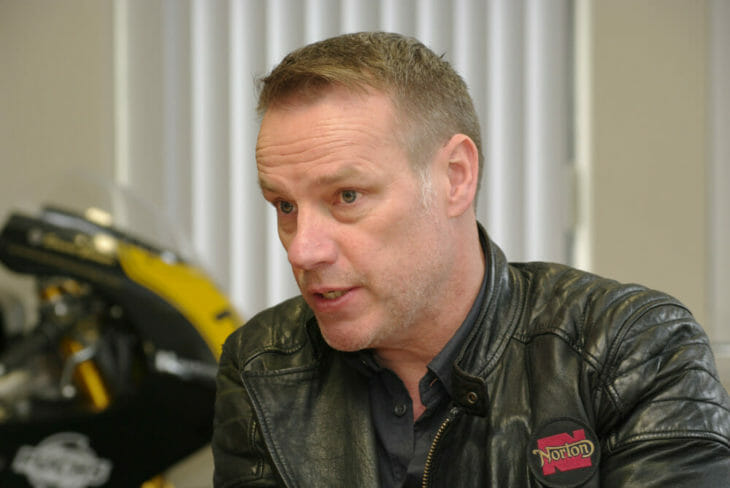
Stuart Garner has worked tirelessly in putting the born-again Norton Motorcycles firm back on the map, with getting on for 5,000 motorcycles so far built and delivered to customers around the world under his ownership. However, it’s seemingly apparent that his time at Norton is now over, especially with potentially serious and even criminal issues that are gradually coming to light surrounding the company’s pension scheme. As Norton’s future existence is called into question, more and more of its UK customers are coming forward who have either parted with a deposit on their chosen model or paid for it in full upfront—yet have not received what they paid for, in some cases years after making that payment.
Sadly, they’re likely to be left severely out of pocket as BDO’s management team hauls over the embers of Norton Motorcycles, and tries to establish a means of keeping the company afloat, rather than breaking it up and liquidating its assets. Given that Garner and Skinner and the team of Norton engineers have created two excellent model platforms, one of them potentially with large-scale marketplace appeal, the product-led future for Norton Motorcycles after being placed in what is the UK equivalent to US Chapter 11 bankruptcy, still looks healthy.
Any bets on who’ll buy it?
For more Industry News, click here
